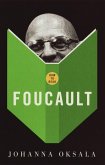The Cambridge Foucault Lexicon
Herausgeber: Lawlor, Leonard; Nale, John
The Cambridge Foucault Lexicon
Herausgeber: Lawlor, Leonard; Nale, John
- Gebundenes Buch
- Merkliste
- Auf die Merkliste
- Bewerten Bewerten
- Teilen
- Produkt teilen
- Produkterinnerung
- Produkterinnerung
A reference tool providing clear and incisive definitions and descriptions of all of Foucault's major terms and influences.
Andere Kunden interessierten sich auch für
![The Cambridge Foucault Lexicon The Cambridge Foucault Lexicon]() The Cambridge Foucault Lexicon42,99 €
The Cambridge Foucault Lexicon42,99 €![The Cambridge Companion to Foucault The Cambridge Companion to Foucault]() Gary Gutting (ed.)The Cambridge Companion to Foucault41,99 €
Gary Gutting (ed.)The Cambridge Companion to Foucault41,99 €![The Cambridge Introduction to Michel Foucault The Cambridge Introduction to Michel Foucault]() Lisa Downing (University of Exeter)The Cambridge Introduction to Michel Foucault70,99 €
Lisa Downing (University of Exeter)The Cambridge Introduction to Michel Foucault70,99 €![The Foucault Reader The Foucault Reader]() Michel FoucaultThe Foucault Reader20,99 €
Michel FoucaultThe Foucault Reader20,99 €![The History of Sexuality, Vol. 2 The History of Sexuality, Vol. 2]() Michel FoucaultThe History of Sexuality, Vol. 223,99 €
Michel FoucaultThe History of Sexuality, Vol. 223,99 €![Foucault - The Key Ideas Foucault - The Key Ideas]() Paul OliverFoucault - The Key Ideas18,99 €
Paul OliverFoucault - The Key Ideas18,99 €![How to Read Foucault How to Read Foucault]() Johanna OksalaHow to Read Foucault18,99 €
Johanna OksalaHow to Read Foucault18,99 €-
-
-
A reference tool providing clear and incisive definitions and descriptions of all of Foucault's major terms and influences.
Hinweis: Dieser Artikel kann nur an eine deutsche Lieferadresse ausgeliefert werden.
Hinweis: Dieser Artikel kann nur an eine deutsche Lieferadresse ausgeliefert werden.
Produktdetails
- Produktdetails
- Verlag: Cambridge University Press
- Seitenzahl: 758
- Erscheinungstermin: 26. Juni 2014
- Englisch
- Abmessung: 260mm x 183mm x 45mm
- Gewicht: 1746g
- ISBN-13: 9780521119214
- ISBN-10: 0521119219
- Artikelnr.: 39339433
- Herstellerkennzeichnung
- Libri GmbH
- Europaallee 1
- 36244 Bad Hersfeld
- gpsr@libri.de
- Verlag: Cambridge University Press
- Seitenzahl: 758
- Erscheinungstermin: 26. Juni 2014
- Englisch
- Abmessung: 260mm x 183mm x 45mm
- Gewicht: 1746g
- ISBN-13: 9780521119214
- ISBN-10: 0521119219
- Artikelnr.: 39339433
- Herstellerkennzeichnung
- Libri GmbH
- Europaallee 1
- 36244 Bad Hersfeld
- gpsr@libri.de
Part I. Terms: 1. Abnormal
2. Actuality
3. Archaeology
4. Archive
5. Author
6. Bio-history
7. Bio-politics
8. Bio-power
9. Body
10. Care
11. Christianity
12. Civil society
13. Conduct
14. Confession
15. Contestation
16. Control
17. Critique
18. Death
19. Desire
20. Difference
21. Discipline
22. Discourse
23. Dispositif (Apparatus)
24. Double
25. Ethics
26. Event
27. Experience
28. Finitude
29. Freedom
30. Friendship
31. Genealogy
32. Governmentality
33. Hermeneutics
34. History
35. Historical a priori
36. Homosexuality
37. Human sciences
38. Institution
39. The intellectual
40. Knowledge
41. Language
42. Law
43. Liberalism
44. Life
45. Literature
46. Love
47. Madness
48. Man
49. Marxism
50. Medicine
51. Monster
52. Multiplicity
53. Nature
54. Normalization
55. Outside
56. Painting (and photography)
57. Parrhesia
58. Phenomenology
59. Philosophy
60. Plague
61. Pleasure
62. Politics
63. Population
64. Power
65. Practice
66. Prison
67. Prison Information Group (GIP)
68. Problematization
69. Psychiatry
70. Psychoanalysis
71. Race (and racism)
72. Reason
73. Religion
74. Resistance
75. Revolution
76. Self
77. Sex
78. Sovereignty
79. Space
80. Spirituality
81. State
82. Statement
83. Strategies (and tactics)
84. Structuralism
85. Subjectification
86. Technology (of discipline, governmentality, and ethics)
87. Transgression
88. Truth
89. Violence
90. The visible
91. War
Part II. Proper Names: 92. Louis Althusser
93. The Ancients (Stoics and Cynics)
94. Georges Bataille
95. Xavier Bichat
96. Ludwig Binswanger
97. Maurice Blanchot
98. Henri de Boulainvilliers
99. Georges Canguilhem
100. Gilles Deleuze
101. Jacques Derrida
102. René Descartes
103. Sigmund Freud
104. Jurgen Habermas
105. Georg Wilhelm Friedrich Hegel
106. Martin Heidegger
107. Jean Hyppolite
108. Immanuel Kant
109. Niccolò Machiavelli
110. Maurice Merleau-Ponty
111. Friedrich Nietzsche
112. Plato
113. Pierre Rivière
114. Raymond Roussel
115. Jean-Paul Sartre
116. William Shakespeare
117. Carl Von Clausewitz
Part III. Chronology of Michel Foucault's Life.
2. Actuality
3. Archaeology
4. Archive
5. Author
6. Bio-history
7. Bio-politics
8. Bio-power
9. Body
10. Care
11. Christianity
12. Civil society
13. Conduct
14. Confession
15. Contestation
16. Control
17. Critique
18. Death
19. Desire
20. Difference
21. Discipline
22. Discourse
23. Dispositif (Apparatus)
24. Double
25. Ethics
26. Event
27. Experience
28. Finitude
29. Freedom
30. Friendship
31. Genealogy
32. Governmentality
33. Hermeneutics
34. History
35. Historical a priori
36. Homosexuality
37. Human sciences
38. Institution
39. The intellectual
40. Knowledge
41. Language
42. Law
43. Liberalism
44. Life
45. Literature
46. Love
47. Madness
48. Man
49. Marxism
50. Medicine
51. Monster
52. Multiplicity
53. Nature
54. Normalization
55. Outside
56. Painting (and photography)
57. Parrhesia
58. Phenomenology
59. Philosophy
60. Plague
61. Pleasure
62. Politics
63. Population
64. Power
65. Practice
66. Prison
67. Prison Information Group (GIP)
68. Problematization
69. Psychiatry
70. Psychoanalysis
71. Race (and racism)
72. Reason
73. Religion
74. Resistance
75. Revolution
76. Self
77. Sex
78. Sovereignty
79. Space
80. Spirituality
81. State
82. Statement
83. Strategies (and tactics)
84. Structuralism
85. Subjectification
86. Technology (of discipline, governmentality, and ethics)
87. Transgression
88. Truth
89. Violence
90. The visible
91. War
Part II. Proper Names: 92. Louis Althusser
93. The Ancients (Stoics and Cynics)
94. Georges Bataille
95. Xavier Bichat
96. Ludwig Binswanger
97. Maurice Blanchot
98. Henri de Boulainvilliers
99. Georges Canguilhem
100. Gilles Deleuze
101. Jacques Derrida
102. René Descartes
103. Sigmund Freud
104. Jurgen Habermas
105. Georg Wilhelm Friedrich Hegel
106. Martin Heidegger
107. Jean Hyppolite
108. Immanuel Kant
109. Niccolò Machiavelli
110. Maurice Merleau-Ponty
111. Friedrich Nietzsche
112. Plato
113. Pierre Rivière
114. Raymond Roussel
115. Jean-Paul Sartre
116. William Shakespeare
117. Carl Von Clausewitz
Part III. Chronology of Michel Foucault's Life.
Part I. Terms: 1. Abnormal
2. Actuality
3. Archaeology
4. Archive
5. Author
6. Bio-history
7. Bio-politics
8. Bio-power
9. Body
10. Care
11. Christianity
12. Civil society
13. Conduct
14. Confession
15. Contestation
16. Control
17. Critique
18. Death
19. Desire
20. Difference
21. Discipline
22. Discourse
23. Dispositif (Apparatus)
24. Double
25. Ethics
26. Event
27. Experience
28. Finitude
29. Freedom
30. Friendship
31. Genealogy
32. Governmentality
33. Hermeneutics
34. History
35. Historical a priori
36. Homosexuality
37. Human sciences
38. Institution
39. The intellectual
40. Knowledge
41. Language
42. Law
43. Liberalism
44. Life
45. Literature
46. Love
47. Madness
48. Man
49. Marxism
50. Medicine
51. Monster
52. Multiplicity
53. Nature
54. Normalization
55. Outside
56. Painting (and photography)
57. Parrhesia
58. Phenomenology
59. Philosophy
60. Plague
61. Pleasure
62. Politics
63. Population
64. Power
65. Practice
66. Prison
67. Prison Information Group (GIP)
68. Problematization
69. Psychiatry
70. Psychoanalysis
71. Race (and racism)
72. Reason
73. Religion
74. Resistance
75. Revolution
76. Self
77. Sex
78. Sovereignty
79. Space
80. Spirituality
81. State
82. Statement
83. Strategies (and tactics)
84. Structuralism
85. Subjectification
86. Technology (of discipline, governmentality, and ethics)
87. Transgression
88. Truth
89. Violence
90. The visible
91. War
Part II. Proper Names: 92. Louis Althusser
93. The Ancients (Stoics and Cynics)
94. Georges Bataille
95. Xavier Bichat
96. Ludwig Binswanger
97. Maurice Blanchot
98. Henri de Boulainvilliers
99. Georges Canguilhem
100. Gilles Deleuze
101. Jacques Derrida
102. René Descartes
103. Sigmund Freud
104. Jurgen Habermas
105. Georg Wilhelm Friedrich Hegel
106. Martin Heidegger
107. Jean Hyppolite
108. Immanuel Kant
109. Niccolò Machiavelli
110. Maurice Merleau-Ponty
111. Friedrich Nietzsche
112. Plato
113. Pierre Rivière
114. Raymond Roussel
115. Jean-Paul Sartre
116. William Shakespeare
117. Carl Von Clausewitz
Part III. Chronology of Michel Foucault's Life.
2. Actuality
3. Archaeology
4. Archive
5. Author
6. Bio-history
7. Bio-politics
8. Bio-power
9. Body
10. Care
11. Christianity
12. Civil society
13. Conduct
14. Confession
15. Contestation
16. Control
17. Critique
18. Death
19. Desire
20. Difference
21. Discipline
22. Discourse
23. Dispositif (Apparatus)
24. Double
25. Ethics
26. Event
27. Experience
28. Finitude
29. Freedom
30. Friendship
31. Genealogy
32. Governmentality
33. Hermeneutics
34. History
35. Historical a priori
36. Homosexuality
37. Human sciences
38. Institution
39. The intellectual
40. Knowledge
41. Language
42. Law
43. Liberalism
44. Life
45. Literature
46. Love
47. Madness
48. Man
49. Marxism
50. Medicine
51. Monster
52. Multiplicity
53. Nature
54. Normalization
55. Outside
56. Painting (and photography)
57. Parrhesia
58. Phenomenology
59. Philosophy
60. Plague
61. Pleasure
62. Politics
63. Population
64. Power
65. Practice
66. Prison
67. Prison Information Group (GIP)
68. Problematization
69. Psychiatry
70. Psychoanalysis
71. Race (and racism)
72. Reason
73. Religion
74. Resistance
75. Revolution
76. Self
77. Sex
78. Sovereignty
79. Space
80. Spirituality
81. State
82. Statement
83. Strategies (and tactics)
84. Structuralism
85. Subjectification
86. Technology (of discipline, governmentality, and ethics)
87. Transgression
88. Truth
89. Violence
90. The visible
91. War
Part II. Proper Names: 92. Louis Althusser
93. The Ancients (Stoics and Cynics)
94. Georges Bataille
95. Xavier Bichat
96. Ludwig Binswanger
97. Maurice Blanchot
98. Henri de Boulainvilliers
99. Georges Canguilhem
100. Gilles Deleuze
101. Jacques Derrida
102. René Descartes
103. Sigmund Freud
104. Jurgen Habermas
105. Georg Wilhelm Friedrich Hegel
106. Martin Heidegger
107. Jean Hyppolite
108. Immanuel Kant
109. Niccolò Machiavelli
110. Maurice Merleau-Ponty
111. Friedrich Nietzsche
112. Plato
113. Pierre Rivière
114. Raymond Roussel
115. Jean-Paul Sartre
116. William Shakespeare
117. Carl Von Clausewitz
Part III. Chronology of Michel Foucault's Life.









